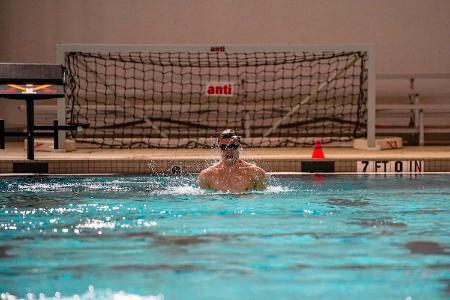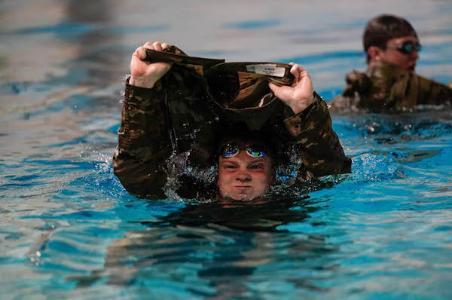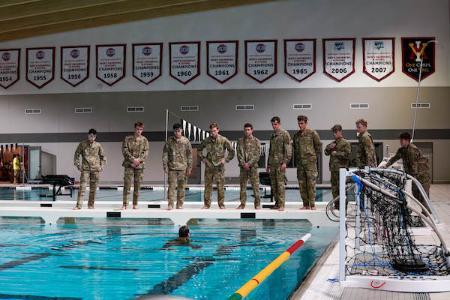Swim Classes Are Historic Part of VMI

LEXINGTON, Va. April 5, 2023 — “The pool is an excellent classroom,” a manual reads. “Let it be used.”
The purpose of swimming instruction is to teach a cadet how to stay alive in the water, according to the first sentence of an old swimming and survival instructional manual. The book dates back to the 1970s, but swim classes at Virginia Military Institute have been required for nearly 90 years.
Col. James “Jimmy” Coale, head of the Department of Human Performance & Wellness (HPW), says this fitness requirement sets VMI apart from other colleges and universities. For seven semesters, cadets enroll in one human performance and wellness class, totaling four credit hours. Most of the classes, like swimming, are half credits. 
Coale said the swim classes are an integral part of not only a student fitness but also whatever cadets choose to do after VMI.
“I think it's great because we're waterproofing the cadets. They never know what situation they're going to be in down the road,” he said. “These are survival skills so that they can save themselves and potentially other people who are in the water as well.”
Pool history at VMI
The HPW department, originally named the physical education department, was founded in 1933, but swimming has been part of the physical requirement since at least 1916, Coale said.
Before a swimming pool was built, cadets used the North River (now known as the Maury River) to swim — and bathe.
According to Mary Laura Kludy, VMI Archives and Records Management specialist, the original Memorial Hall, which was part of barracks, was intended to have a swimming pool and gymnasium,but that was never built. The second Memorial Hall — the one standing today — was built in 1916 as a separate building, where a swimming pool was constructed. That pool remained until a new one was built in 1936 in its place. There was also a tunnel connecting it to Cocke Hall where dressing rooms were located.
In 1969, the annex to Cocke Hall was built, which included a new pool. By 1999, the third floor of Cocke Hall was renovated and the pool was either upgraded or completely replaced at that time, Kludy said the history was unclear.
This year, the new Aquatic Center opened.
The significance of swim class
There’s a confidence that comes from taking these classes, Deanne Moosman, HPW swim instructor, said. A lot of fear of the water stems psychologically. But, she says that it’s totally natural to have some anxiety when it comes to getting in the water.
 “It's just trying to get them in the water as much as possible to boost their confidence. When their anxiety levels are lower, their heart rate is lower,” she said.
“It's just trying to get them in the water as much as possible to boost their confidence. When their anxiety levels are lower, their heart rate is lower,” she said.
Going back to that 1970s swimming manual, it said, “The emotional stability of the students participating in these courses is more than likely to be tried. In spite of numerous frustrations and uncertainties, successful completion is possible for everyone. No activity offers a cadet greater opportunity for developing self-confidence than do these courses, and accordingly, he may save not only his own life but that of someone else.”
Swimming also helps with the concept VMI has of overall wellness.
“This is something that they can do throughout their cadetship, maybe with cross training or just enjoyment of getting in the water (and) having a good workout, but then beyond that, too,” Coale said.
Noah Ahrens ’25 signed up to take HPW 201 this semester. He said he hadn’t taken a swim class prior to this or competed in swimming but had experience swimming on his own.
“I think the physical fitness class requirements are a great idea introducing those at VMI to different aspects of fitness and it allows them to see which fitness aspects or activities they enjoy the most,” Ahrens said. “My experience with the class is great. I have been learning new skills in strokes of swimming that I did not know before.”
Athelia Long ’25 is also enrolled in the basic swimming and survival class, with a similar skill level as Ahrens. She said before taking the class, she never knew the proper techniques of different strokes.
“Coming to VMI, I thought it was interesting that there were many physical fitness class requirements,” she said. “This is because it is unusual to see physical fitness classes that are required in other colleges. But, in the end, I knew that VMI is a physically demanding college so I expected classes to have a physical fitness aspect that most colleges wouldn’t have.”
Long said that prior to taking fitness classes, she thought they would be unnecessary.
“After experiencing the classes, I realized how important it is to know these skills in certain circumstances. In Basic Swimming and Survival I have learned skills such as treading water as well as breathing techniques to perform better at swimming,” she said. “So far, my experience with this class has been great. I am able to challenge myself with skills that I did not know before and I know that it will benefit me in the long run. I can say for certain that I feel more comfortable and better skilled in the water.”
Swim Requirements at VMI
As a 4th Class cadet, you are required to take two human performance and wellness required courses. When you’re a 3rd Class cadet, that’s when swimming comes in. You are required to take HPW 205 (Principles of Physical Conditioning) and HPW 200/201 (Swimming), one each semester. Upon your final two years, a cadet can opt for HPW electives. 
Swimming — either HPW 200 (Beginner Swim) or 201 (Swim Survival) — is also required for a cadet to graduate. The 200-level class is for those who may be a bit wary of the water and the 201-level class is for those who have a bit more experience in the water.
“Clearly, everybody is at a different level,” said Moosman. She said in the 201-level class, they build up the cadets to proficiency to meet the skill requirements.
“So, they're tested,” she said. “We could have somebody who hasn't been in the water since they were 10 years old. And then we have someone who swam in high school. We work with all levels, and we get everybody to pass those skills tests or they move into HPW 200 and get more time, more personal attention.”
Laura Peters Shapiro
Photos by Lexie West
Communications & Marketing
VIRGINIA MILITARY INSTITUTE
.svg)
.png)